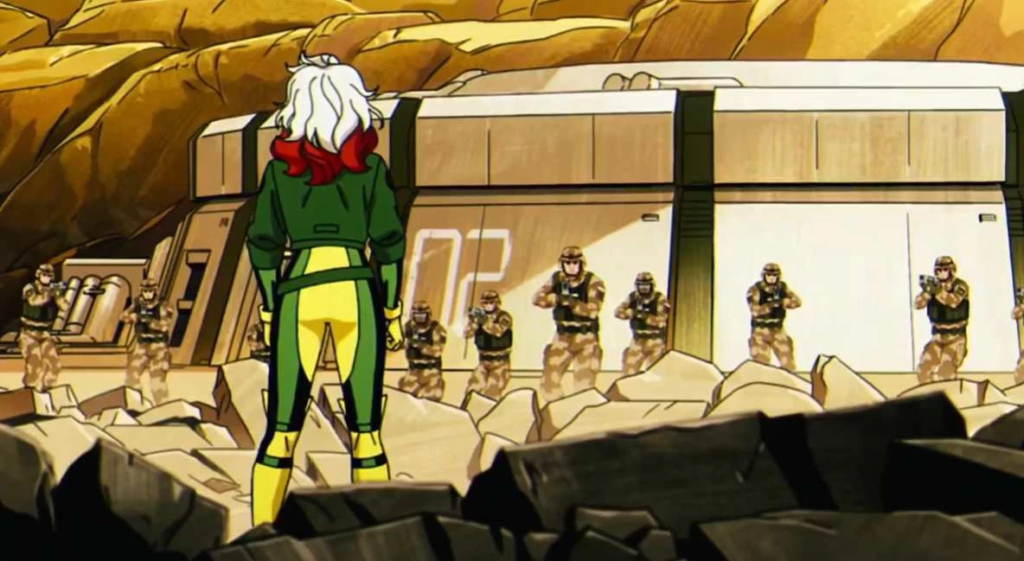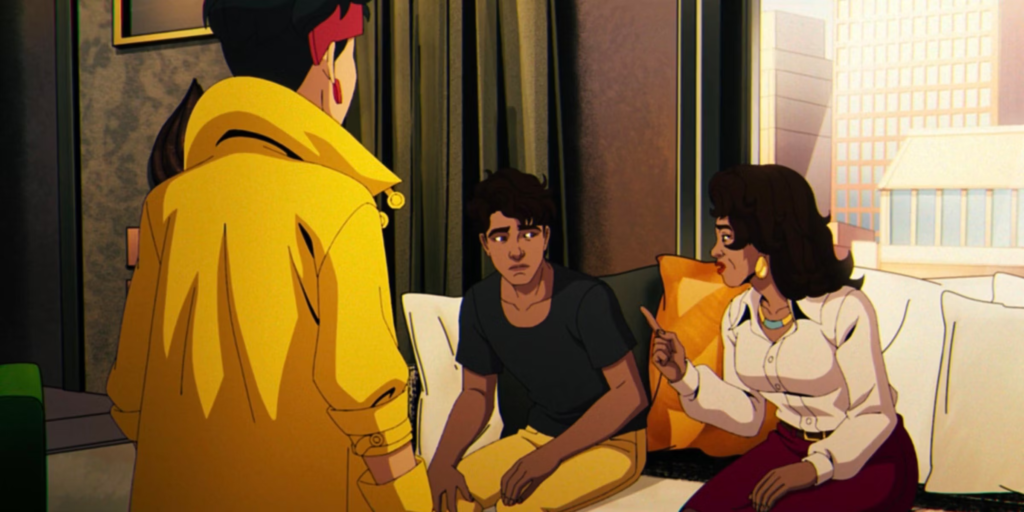
In the riveting seventh episode of X-Men ’97, the series not only captivates with its storytelling but also mirrors poignant real-world conflicts, akin to the ongoing strife in places like Palestine and Israel. This episode, titled “Bight Eyes” delves deep into the aftermath of the fictional Genosha Genocide, reflecting the harsh realities of loss and the struggle for acceptance faced by marginalized communities.

The Struggle for Acceptance
The narrative poignantly explores the mutants’ realization that their quest for tolerance from humanity may be futile. Beast’s interaction with Trish Tilby becomes a heartbreaking highlight, as it underscores the painful truth that even those closest to the mutants may only offer tolerance, not true acceptance. This mirrors the real-world plight of countless communities fighting for their basic rights and recognition, where often, the bare minimum is grudgingly allotted rather than genuine acceptance.

Art Imitating Life
The episode masterfully uses its characters to voice the frustrations and pain of the unheard. Beast’s quote, “Riots are the language of the unheard,” originally from Martin Luther King Jr., resonates deeply in today’s socio-political climate, emphasizing the show’s relevance. The mutants’ fight for survival and dignity parallels the struggles of real-world minorities, echoing the sentiments and protests seen globally as they seek justice and equality.
Reflections on War and Loss
Lenore Zann’s portrayal of Rogue in this episode of *X-Men ’97* deeply explores the multifaceted aspects of grief and anger. Through her compelling voice acting, Zann conveys Rogue’s immense personal and collective agony. This episode further establishes Rogue’s formidable strength, illustrating her ability to break into prisons reputed to hold even the Hulk, underscoring the depths of her capabilities and the intensity of her resolve.
A particularly poignant moment occurs during Rogue’s confrontation with a general, where her response to his remark, “I thought you guys were the good guys,” with “You killed those, Sugah, now you got me,” encapsulates the transformation of her grief into a fierce determination for justice. This exchange not only highlights her personal pain but also her unwillingness to abide by a passive role in the face of blatant injustices. This sentiment resonates with the ongoing global conflicts, where responses from those in power often reflect a mix of complicity and denial, further exacerbating the struggles and suffering of the oppressed.

Queer Representation and Authenticity
The episode poignantly captures the tension between authenticity and safety within the queer community through the nuanced dialogue between Sunspot and Jubilee. Their conversation reflects the profound dilemmas faced by queer individuals, such as the heart-wrenching question, “Do you want your family to bury a stranger?” This line echoes the struggles of living authentically versus remaining concealed, a theme painfully relevant in the context of events like the Pulse Massacre.
This episode’s exploration of queer identity is further highlighted in the dynamic between Jubilee and Roberto’s mother. The scene where Roberto’s mother accepts her son but chooses to conceal his mutancy for corporate interests starkly illustrates the compromises often made at the intersection of personal identity and societal expectations. Jubilee’s anticipated fiery response to this concealment promises a powerful exploration of standing up against such compromises. The show commendably portrays these conflicts, enhancing its relevance and resonance with real-world issues faced by the queer community today.

Culmination in Confrontation
The climactic end of the episode comes with the reveal of Bastion as the primary antagonist, a nod to the ominous Operation: Zero Tolerance arc from the 1997 Marvel Comics. This storyline, known for its intense critique of governmental overreach, sets a grave tone for the series, mirroring contemporary issues of surveillance and control in the guise of national security, much like the ongoing global debates around privacy and civil liberties.
Bastion, the embodiment of unchecked governmental power, originally introduced in the Operation: Zero Tolerance storyline, emerges in the series as a stark symbol of the dangers of allowing fear to dictate policy. His character draws direct parallels to real-world situations where governments, citing security concerns, have implemented draconian measures that often result in the segregation and oppression of marginalized communities.
This episode also delivers a potent conclusion to the arcs of Gyrich and Trask. Trask’s demise at the hands of Rogue—after which he is revealed as a Prime Sentinel—underscores the mutants’ dire situation. Rogue’s act, dropping Trask from a tower, becomes a symbolic rejection of the dehumanizing treatment mutants have endured. This scene, while charged with action, serves as a grim reminder of the consequences of dehumanization and prejudice, echoing the harsh realities faced by those stigmatized in society.
The depiction of Bastion, voiced with chilling precision by Theo James, brings a new layer of menace to the series. His preference for the song “Purple People Eater” during his grim scenes (killing Gyrich and shaving Magneto) serves multiple thematic purposes. The whimsical nature of the song starkly contrasts with Bastion’s menacing mission and origin (as a character evolved from Nimrod, the futuristic Sentinel), adding an unexpected quirk to his character. This contrast not only enriches his portrayal but also subtly mocks the fear and misunderstanding surrounding mutants, akin to the bizarre creature in the song. Furthermore, Bastion’s enjoyment of the tune could be seen as a cynical nod to the sensationalism and hysteria often surrounding perceived threats in society. His origins as Nimrod highlight this irony, as he was created in response to exaggerated fears of the mutant ‘other,’ now himself participating in a culture that both fears and trivializes threats in equal measure. This layering of themes through the song choice adds depth to the narrative, illustrating the complex interplay between fear, identity, and societal reactions within the world of X-Men.
As the episode ties up its loose ends, it leaves viewers reflecting on the broader implications of Bastion’s machinations, setting the stage for future conflicts. The narrative thread involving Magneto, potentially being transformed into a Prime Sentinel, promises a continuation of themes exploring identity, resistance, and the fight for autonomy, resonating deeply with anyone familiar with the struggles for recognition and rights in today’s world.

Looking Forward
As X-Men ’97 unfolds, it continues to blur the lines between heroes and villains, reflecting the complex moral landscapes of our world. My speculation is that the series is setting the stage for a dramatic narrative arc in Season 2, potentially exploring the Onslaught saga. This could lead to a riveting clash between a Prime Sentinel Magneto and Charles Xavier, symbolizing the deep ideological conflicts within the X-Men universe.
The recent developments in character dynamics, such as Jean Grey’s emergence as a formidable telekinetic in contrast to her earlier portrayals (we finally get to see the Faint Queen retire and badass Jean show up), and Emma Frost’s adaptation of her diamond form—a mutation first seen in *New X-Men* #139 by Grant Morrison—add rich layers to the storyline. These enhancements signal a shift towards exploring resilience and vulnerability.
Given these elements, the series might be gearing up for a climactic finale that could reshape the narrative landscape. The introduction of advanced abilities in characters like Morph – revealing that he can adopt the abilities of whoever he morphs into which is a departure from his previous incarnations – and the spiritual depth added through Nightcrawler’s development suggest a buildup to more complex character-driven stories. This speculative setup not only raises the stakes for the characters involved but also intensifies the viewer’s anticipation for the resolutions that may redefine their roles in the X-Men lore.

Final Verdict: Omega Level Entertainment
X-Men ‘97 delivers more “Omega Level Entertainment” with its intricate character development and captivating plot twists in this episode.
Leave a Reply